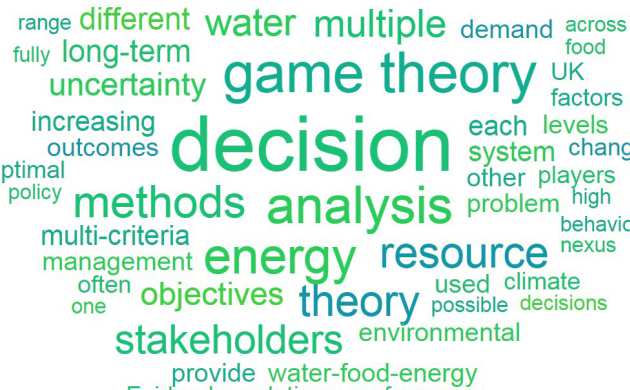Topics: Impacts and adaptation
Type: Briefing paper
Publication date: September 2015
Download
Summary
 Authors: Dr Kaveh Madani, Dr Geoff Darch, Fernando Parra and Dr Mark Workman
Authors: Dr Kaveh Madani, Dr Geoff Darch, Fernando Parra and Dr Mark Workman
The resources required for human and planetary wellbeing are under increasing strain from over-use. This strain is a consequence of a number of interlinked factors, including population growth, affluence, poverty and climate change. The resource nexus agenda has developed to provide a better understanding of the complex interrelationships between resources and the stresses involved.
In the water-food-energy nexus, for example, the production of food on increasingly marginal land requires greater volumes of water and energy-intensive processes and inputs such as fertilisers to increase yields to match rising demand. Whilst a ‘predict and provide’ approach still pervades in resource planning, there is also a recognition of economic, social and environmental constraints and even limits. Decision making in this context is complex: it is multi-sectorial, often with a limited understanding of interdependencies; it is multi-objective i.e. attempting to balance competing factors; and has multiple stakeholders, each with their own objectives.
High levels of uncertainty about the interlinked water-food-energy nexus and about the future mean that traditionally preferred ‘optimal’ approaches to resource allocation may not provide flexibility or robustness, and this problem is particularly acute in the multi-stakeholder context. Game theory, the mathematical study of competition and cooperation, is able to offer insights for planning in such circumstances, supporting other recognised methods such as scenario analysis, robust decision making and integrated assessment modelling.
The headlines
- Global tensions over the provision of water, food and energy are growing in response to demographic change and rapid economic development.
- Whilst water-food-energy challenges are becoming increasingly interconnected by complex ecological, socio-economic and sociopolitical factors, this complexity is not adequately reflected in assessments of these challenges, or in problem solving.
- There is a need to integrate multi-actor, multi-objective frameworks for interlinked water-food-energy challenges across scales and between scales, whilst accommodating uncertainty.
- There are multiple decision making tools available but their ability to replicate the capacity for compromise amongst stakeholders and objectives in real-world decision making processes is limited.
- Game theory can offer an alternative decision making approach by generating a set of near-optimal, feasible and ‘stable’ results, allowing the analysis of the various trade-offs involved, and of potential fallback positions. The outputs from such an approach can be practical in real-world situations when compared to the ‘optimal’, but often impracticable options, given by conventional multi-objective optimisation methods.
Download now: Using Game Theory to Address Modern Resource Management Problems - BN 2
View publications by:
Topic
Climate Science
Earth and Life Sciences
Energy and Low-Carbon Futures
Resources and Pollution
Economics and Finance
Health
View all publications and browse by year
Publication type
Briefing papers and Briefing notes
Grantham Institute Outlooks
Evidence & submission papers
Infographics
Institute reports and analytics notes
Grantham notes
Collaborative publications
Discussion papers
Institute event overviews
Working papers